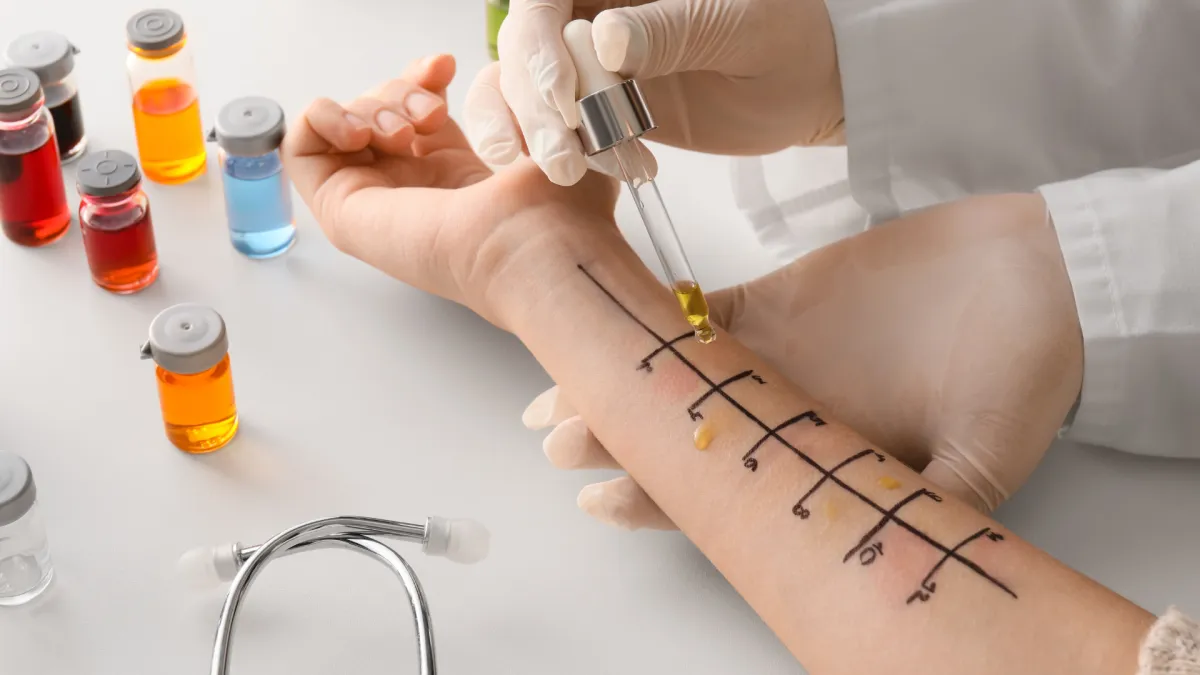5420 Strickland Ave, Lakeland, FL 33812
Mon-Thu 8:30 am - 4:30 pm
Fri 8:30 am - 12:00 pm
Understanding Allergies
5420 Strickland Ave, Lakeland, FL 33812
Located In Hickman Office Park
Mon-Thu 8:30 am - 4:30 pm
Fri 8:30 am - 12:00 pm
Allergies' Early Signs of Trouble
An allergy is an exaggerated immune response to a substance that is typically harmless to most people. These substances, called allergens, can trigger an allergic reaction when they come into contact with the body, either through ingestion, inhalation, or skin contact. When an allergic person encounters an allergen, their immune system produces antibodies called immunoglobulin E (IgE), which then trigger the release of chemicals like histamine, leading to allergic symptoms. Allergies can range from mild, causing symptoms like sneezing and itching, to severe, potentially causing life-threatening reactions such as anaphylaxis.
Commonality Of Anaphlaxis
Anaphylaxis is a severe and potentially life-threatening allergic reaction that requires immediate medical attention. While it's not as common as other types of allergic reactions, such as allergic rhinitis or allergic dermatitis, it can occur in people with allergies to certain foods (like peanuts, tree nuts, shellfish), medications (like antibiotics or aspirin), insect stings (like bee or wasp stings), or latex. Anaphylaxis is characterized by a rapid onset and can affect multiple organ systems, leading to symptoms such as difficulty breathing, swelling of the throat or tongue, a drop in blood pressure, rapid heartbeat, nausea, vomiting, and loss of consciousness. Prompt treatment with epinephrine (adrenaline) is essential to counteract the reaction and prevent serious complications.
Types Of Anaphylaxis
Anaphylaxis can be categorized into two main types based on the timing of the reaction and whether the trigger is known. Determining the type of anaphylaxis typically involves a thorough medical history, including details about the timing and circumstances of the allergic reaction, as well as any known allergies or sensitivities. Diagnostic tests, such as skin prick tests or blood tests (specific IgE testing), may also be performed to identify allergens that could trigger anaphylaxis. In some cases, anaphylaxis may be diagnosed based on clinical symptoms alone, especially when there is a clear temporal relationship between exposure to a suspected allergen and the onset of symptoms.
1. Acute anaphylaxis
2. Delayed anaphylaxis
Treatment
Treatment for anaphylaxis involves a series of steps aimed at rapidly stabilizing the individual and preventing further progression of the allergic reaction. Here's a detailed description of each treatment:
Epinephrine (adrenaline) injection
Epinephrine is the first-line treatment for anaphylaxis and is administered via an auto-injector device (such as EpiPen® or Auvi-Q®) into the thigh muscle. It works quickly to reverse the symptoms of anaphylaxis by constricting blood vessels, increasing heart rate, improving breathing, and reducing swelling and hives.
It's important to administer epinephrine as soon as anaphylaxis is suspected, even if the diagnosis is uncertain, as delaying treatment can lead to worsening symptoms and complications.

Supplemental Treatments
Depending on the severity of the reaction and the individual's symptoms, additional treatments may be necessary. Antihistamines, such as diphenhydramine (Benadryl®), can help reduce itching, hives, and other allergic symptoms. Corticosteroids, such as prednisone or methylprednisolone, may be given to reduce inflammation and prevent delayed or recurrent symptoms. They are typically administered orally or intravenously.
Oxygen therapy
Oxygen therapy for anaphylaxis is a supportive treatment aimed at improving oxygenation and breathing in individuals experiencing respiratory distress as a result of the allergic reaction. Anaphylaxis can cause severe airway swelling (angioedema) or constriction (bronchoconstriction), leading to difficulty breathing and decreased oxygen levels in the blood. Oxygen therapy helps address these issues by providing supplemental oxygen to the lungs.
There's A Treatment That's Right For You
Ear, Nose
& Throat Care
Expert care and treatment for conditions & infections causing discomfort to the ears, nose, or throat.
Neck &
Head Care
Analysis and treatment for skin tumors on the head and neck and other related conditions.
Allergy Treatment & Management
Treatment with the goal of reducing the symptoms of allergies and make them less noticeable or dangerous.
Treatment For
Sleep Apnea
Treatment for sleep apnea disorder that make it easier to sleep, breathe while asleep, and get restful sleep.
Ear
Your ears enable you to experience many beautiful things in life such as great music, voices of loved ones, sounds of nature, and other great aspects of sound. Proper care is important to treating ear infections or discomfort which can be frustrating to deal with and can affect how you conduct your daily life.
Nose
Your nose helps filter out harmful allergens, allows you to breathe easily, take in the scent of home cooked meals, and add to the experience of outdoor adventures. Keeping your senses in good shape and reducing symptoms of allergies helps you stay happy and able to enjoy the big and small moments life has to offer.
Throat
Your neck and throat health are essential to staying comfortable in your daily life. You may not even think much about these parts of your body on a daily basis until an issue like recurring infections or nodules of the throat, thyroid, or vocal cords makes it uncomfortable to sleep, breathe, talk, or sing.
Getting Started Is Easy
Make An
Appointment
Receive
Treatment
Schedule A
Follow Up
Get Your
Life Back
We understand that living discomfort can be burdensome.
We've been helping families like yours for over 20 Years.
We Save Money For Families By Providing Effective Treatment & Preventing Long Term Damage
Our Practice Has Been Serving The Community Since 2002
Thousands Of Patients Have Seen Results From Treatment
Family Care Ear, Nose & Throat Physician

Dr. Herman Matallana, DO
Otolaryngology Specialist
Dr. Herman Matallana, known by his patients as Dr. Mat, is a dedicated physician with over ten years of experience in the treatment of Ear, Nose and Throat, Reconstructive Surgery and Allergies. Dr. Mat graduated from Kansas City University of Medicine and Bio-Sciences and did his specialization in Otolaryngology, Head & Neck and Reconstructive Surgery at Des Peres Hospital in St. Louis, MO.
What Our Clients Are Saying
What Our Clients
Are Saying

Dr Mat is a great doctor. He is attentive, caring, and best of all he listens to your concerns. His staff are all very polite, respectful and attentive to your needs. This is a doctor's office that work together as a team and they all know without a doubt what's going with each patient. Imñam very grateful that I was referred to Dr Mat.
Brenda B.
★ ★ ★ ★ ★

Dr Mat is AMAZING! He takes time to listen to your concerns and answer questions. My surgery was at Bartow Medical Center. The amount of respect the nurses and other staff members have for Dr Mat shows tremendously. They were amazing and they took phenomenal care of me.
Kylie S.
★ ★ ★ ★ ★

Dr. Matallana has been nothing but amazing for myself and my children. From tubes all the way to reconstructive surgery on my eldest child's nose. Outstanding doctor, outstanding care.
Jess W.
★ ★ ★ ★ ★





